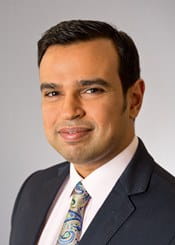Publishing outcomes data for consultants and hospitals in private healthcare will help improve patient care
20 Jul 2016
Dr Vaibhav "VJ" Joshi

From April next year, the Private Healthcare Information Network (PHIN) will publish information about quality and performance for all hospitals and consultants delivering privately funded care in the UK. Hospitals will share their data with us, which we will use to develop a number of performance measures.
These will be available to the public on our website to help people make informed decisions about private healthcare. In order to make sure that everyone benefits from this process, it’s vital that consultant surgeons and physicians engage with the information we’re going to be publishing.
Here’s why it’s so important:
1. The data will be a powerful tool for doctors as well as patients
There are many benefits to patients being able to review objective information about their options when considering what hospital or consultant is right for them. Consultants will also hugely benefit from this process.
For most doctors, this will be the first time they will see the whole of their NHS and private practice summarised within a single report. In effect this will aggregate the data that’s required for appraisal and revalidation into one place, but with the added benefit of being able to deep dive into individual episodes of care. They’ll have an independently evidenced report at their fingertips, demonstrating the wealth and breadth of their experience. The data will highlight areas of great care and, importantly, where improvements can be made.
2. We have to do this in partnership, or the data won’t be right
One of my previous roles at a large NHS trust combined working as an A&E doctor, with a managerial job in Information & Performance. I spent some of my week providing care, and the rest of it analysing data about that care. This gave me an in-depth understanding, not only of how powerful the data could be to help me improve the quality of my work, but also that data had real limitations. I could see what those numbers didn’t tell you. Being able to fill in the gaps meant that I was best placed to identify issues with data capture, making sure we were asking the right people for the right things at the right time.
Long before anything gets published for public consumption, we’ll be sharing with consultants what data we have about them. This will be an opportunity for them to tell us if the data is a complete and accurate record, is fit for purpose, and work with us in deriving information from this.
3. We want what we publish to be a fair and helpful reflection
What we’re doing is complicated. Collecting data is hard enough, but to turn it into information that will be both representative and meaningful for patients is going to be even harder. Only consultants themselves can help us understand that complexity and ensure we’re presenting it in a way that is accurate and fair.
Let me give you an example. Looking at the outcomes from knee operations under different surgeons doesn’t take into account the different mix of cases those surgeons might be taking on. A good outcome might look different depending on whether your patient is a 90-year-old with arthritis or an otherwise healthy 20-year-old skier. It’s very important that we take those pre-existing characteristics into account. Consultants will need to help us identify and understand these nuanced complexities, and present the online information accordingly.
Case mix adjustment is also important for ensuring excellence is recognised and celebrated and that those who take on the more specialised cases aren’t penalised. Think about a specialist heart hospital, patients are likely to have rare and complicated conditions with many factors working against the chances of a good outcome, and yet the surgeons there are probably the best in their field. Our representation of hospitals and consultants must accurately reflect this.
Change can be tough, but it can also be exciting. I feel confident that we'll come out of this process so much stronger as a profession, more transparent, and with more knowledge about ourselves.
Dr Vaibhav “VJ” Joshi is Director of Clinical Informatics at PHIN. He has been in medical informatics for over a decade and helped large NHS and Private sector organisations (London North West Healthcare NHS Trust and Ramsay Health Care) to implement and improve information systems, analysis and performance.
Notes
- A version of this blog was published on PHIN’s website in April.
- For more information, please see these factsheets on the PHIN website.
